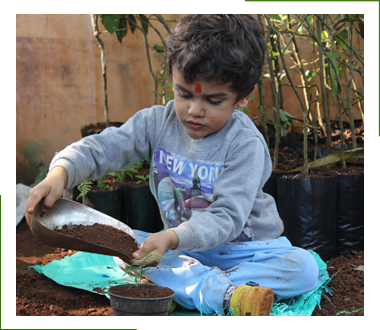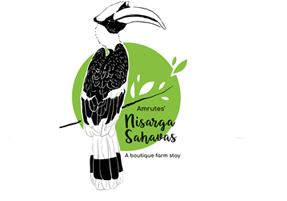OUR ORGANIC FARM
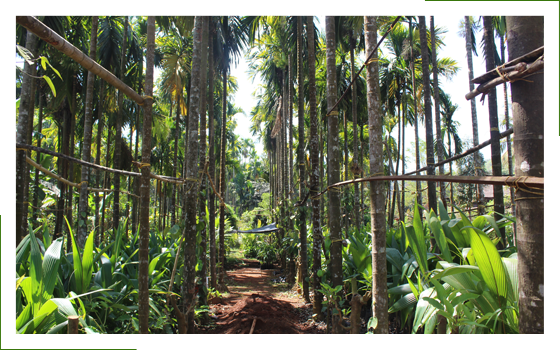
We were fortunate to get a place for our farm where perfect eco-system existed which had total harmony. Mother Nature, as we have observed is impartial. Here, the development in terms of planning our residential house, planting new trees, shrubs, creepers & ground covers etc was done with least interference with original design.
Slowly we got to understand the synergy and symbiosis in nature. Another interesting fact we discovered was that nature without any external interference automatically achieves growth that is INCLUSIVE as opposed to EXLUSIVE growth as conceived by humans. To get started to set up farming activities where a perfect eco-system already existed wasn’t a challenge. All that was needed was minimum destruction, avoiding the so called planned colonies of any single type of plant species & adding various native species of plants to be planted. Trees planted were those that would produce fruits & flowers, some that would attract local & migratory birds, some to attract bees, butterflies & Sun birds with their nectar which some that would offer safe home for birds to make nests. Quite a few were hosts for ants, lady bird beetles & spiders. The presence of all these ensure setting up of perfect eco-system.
Mango, Cashew, Coconut, Betel nut, Kokam, Jackfruit, Chiku, Banana & Pineapple etc are the plants native to the area. Black-pepper & Betel leaf creeping on the Mango, Jackfruit, Coconut & Areca nut grow well bringing valuable additional revenue. Piper logum, Asparagus etc are the herbs growing with least maintenance. Cinnamon, Bayleaf, Nutmeg, All spices etc are growing well. As many as 10 different varieties of love apples, each having a different taste & colour, few varieties of lime grow very well at our farm. Starfruit, Barbados & Singapore cherry attract guests & birds alike. To our surprise some imported varieties for mother plantations such as Rambutan, Philosan, Avocado, Thai passion fruit & Dragon fruit have managed to make our space their mother land. Trees & creepers producing fragrant flowers spread their sweet smell in the whole space. These include Bakul, Surangi, kailaspati, hirwa chafa, Sonchafa, Magnolia, Nag champa, creepers including jasmine, bridal creeper and Passiflora variants.
PLANT NURSERY & PLANT PROPAGATION
Amrutes’ Ashika Rosery (Amrute Nursery) is a plant Nursery established in 1978. Here healthy nursery plants are propagated from mother plants, nurtured, displayed and made available. These include fruit plants, spices, herbs, medicinal plants, aromatic plants, indoor and outdoor ornamental plants, commercial flowering plants like champa, shrubs, creepers and ground covers, plants for agro and social forestry etc. The plants are produced from high quality mother plants of known origin, following scientific propagation techniques. Plants go through strict pre-delivery inspection before delivery.
While at a Nisarga Sahavas you will get valuable suggestions and guidance regarding growing plants. Most of these tips come from deep study and keen observation over the years.
Propagation of plants for plantation at our farm and also for sale has become a major activity. Our village which is situated in a valley has a perfect micro-climate suitable for growing many horticultural crops and also for their propagation. Various plant species that are required for plantation can be easily produced almost throughout the year at our Nursery.
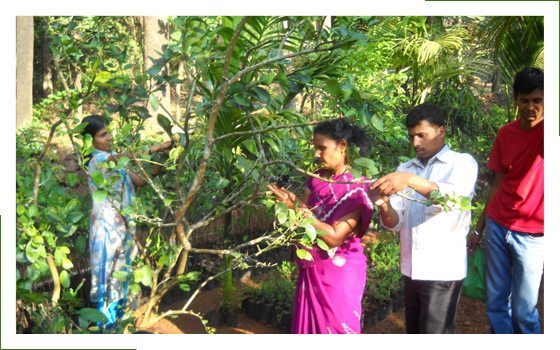
These include Coconut and Arecanut that are grown from seeds, Mango, Cashew, Jackfruit, Kokam, Jamun etc. that require grafting skills and plants like Banana, Pineapple etc. that are produced from their young suckers. Many spice plants such as Black pepper, Cinnamon, Nutmeg, Clove, Bay leaf etc. that have great commercial value too happily grow at our farm. Nursery plants of these are propagated without involving large capital. This has resulted in development of expertise among the village youth and there by having a profound impact on socio-economic development of the village and surrounding. In fact nursery and plant propagation have given village and Dapoli, a unique identity and recognition in the outside world. These skills are further utilised by them to supplement their farm income.
FOOD PROCESSING
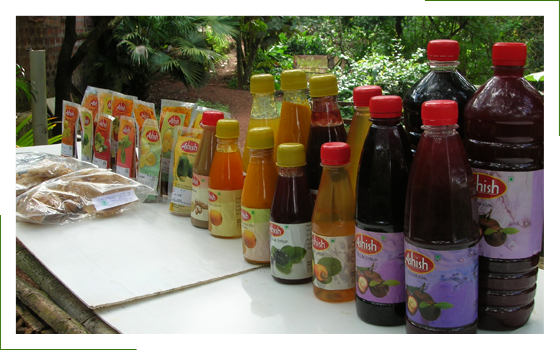
We get seasonal fruits like Mango, Cashew, Jackfruit, Kokam & Jamun. Rice, Nachni (Finger millets), Vari (Little millets), Kulith (Kidney beans) are other crops grown in our village. The agricultural produce in the form of fruits, cereals & pulses can be converted into value added products with enhanced shelf life. We established a set up for this at our farm. Here we produce products such as Kokam Syrup, Cashew-apple Syrup, Karonda Syrups, Raw Mango squash, Jackfruit chips, various pickles, chutneys & papad that have good shelf life and nutritional value because the raw material used is organic and contents of final products have no artificial colours & flavours. Several individual and SHG (Self Help Groups) of women from village and Dapoli taluka have been federated and encouraged to grow various other cottage-scale food products including dry snacks, flour mixes and masalas to be marketed at Nisarga Sahavas as well as beyond Dapoli.
TRAININGs & WORKSHOPs
During our journey of 37 years in the field of farming, we have noticed many amazing and unbelievable facts about farming, nature & the whole eco-system. When we shared these observations with many people who have been doing farming for many years, they too were astonished. Most of our well-wishers suggested that these observations could become a subject of a book. In view of the fact that book as a form of sharing knowledge has its own limitations, we decided to hold short workshops at Amrutes’ Nisarga Sahavas.
Here at Nisarga Sahavas, excellent infrastructure exists for organizing such workshops
The workshops are being held in 2 sessions of 3 hours duration. They will comprise of theory, practical, excursion, hands on experience, group discussion with a special session on “FAQ” (frequently asked questions) where in the learners get answers to the questions they had at the back of their mind for many years. The workshops though may appear to be basic are in reality an “eye opener” for many. In fact training this head covers a wide range of groups including farmers, gardeners, nursery main, corporate clients, students, fellow villagers, house wives, home gardeners and children.
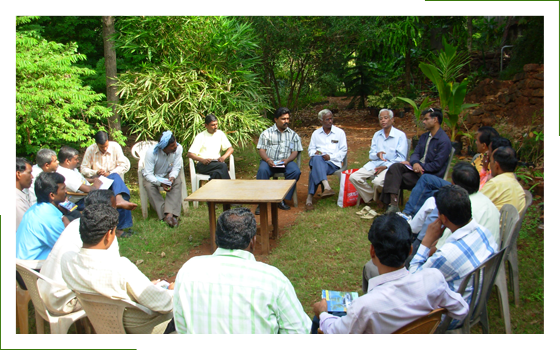
To begin with we have identified the following four subjects for workshops :
The subject matter in these workshops is presented in a manner that it is found interesting to all age groups.
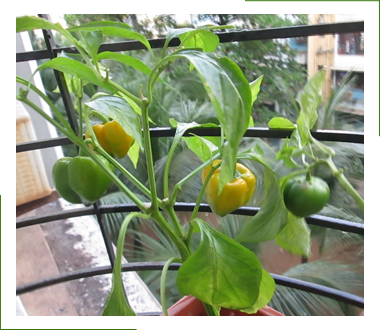
Kitchen Garden and home composting
Why to grow vegetables when they are readily available in the market?? Because most vegetables sold in the market are mostly produced by using hazardous chemicals by way of fertilizers and pesticides which are likely to cause serious health problems.
The limitations for growing own vegetables are space, time, sunlight & know- how. Most of us feel that growing vegetables in cities requires lot of space and time. Moreover it is felt to be messy.
In this workshop we will get to know how to overcome these problems and grow clean, healthy vegetables and herbs for our day to day needs. Most of the city dwellers do have areas like terraces, balconies or at least window grills on which kitchen gardens can be designed. Easy to follow methods involving minimum time, space, water will be shared in the workshop.
What is more, we are also considering the possibility of a small kit of useful tools and a few vegetable seeds, besides notes to help overcome probable problems.
Human Beings, Plants, Animals & Eco-System
Have you ever noticed that there is interesting inter-relationship between human beings, birds, animals & plants in the eco-system? In fact we the human race are only one part of the natural and ecological chain. This chain if left without intervention, works smoothly and automatically. Moreover, in this ecological chain, each unit micro or macro survives, grows and prospers without exploiting rest of the units in the chain. Learners surely will carry with them a message that Human interference in the ecological chain is unnecessary & it disturbs the eco-chain.

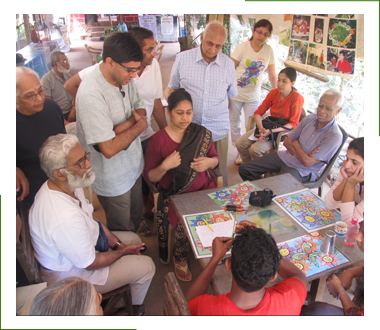
Eco Friendly way of Growing Plants
We all know the importance of plants and trees in our life. In fact, we need oxygen to survive and the plants keep us supplied with Oxygen.
During the past 37 years, we have learnt through experiments & observations that for optimum results in farming, it is vitally important to understand the basics. Once this is done we not only enjoy farming but get most amazing results.
We at Nisarga Sahavas share these experiments & observations during the workshops on eco-friendly ways of growing plants. During the workshops, we unfold the basic concepts like the function of roots, leaves, sunlight, water, and micro & macro elements required by the plants, the roll of insects, birds and micro-organism in the eco-system. We also learn about the root canopy relationship which determines the growth & productivity.
Propagation of Plants
We all know that plants are grown by germinating seeds. But have u ever thought about the process by which a seedling emerges from a little seed? Have you ever thought that if a little seed can give birth to a plant or tree, why other methods of propagation of plants like budding, layering, grafting or tissue culture have at all developed??
In a short workshop spread over 3 hours each at Nisarga Sahavas, we learn & unfold many such secrets Mother Nature has in store. During the course of workshop we share through discussions, practical experiments & hands on trials various techniques of propagating & growing plants. These courses are specially designed to the basic insights about growing plants by germinating seeds to layering, budding & grafting. The subject matter in these workshops is presented in a manner that it is found interesting to all age groups.
